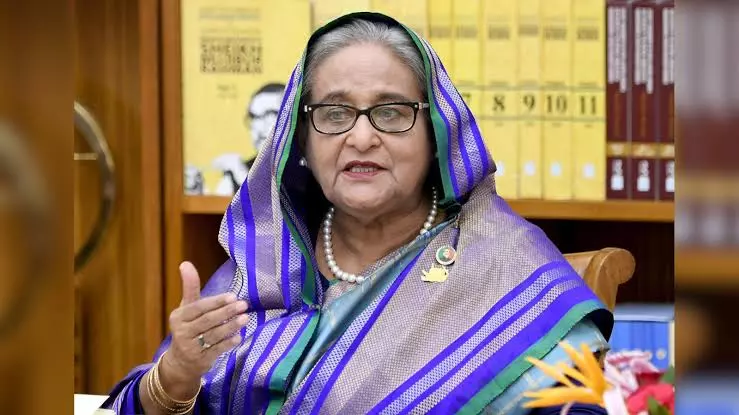
- Home
- India
- World
- Premium
- THE FEDERAL SPECIAL
- Analysis
- States
- Perspective
- Videos
- Sports
- Education
- Entertainment
- Elections
- Features
- Health
- Business
- Series
- In memoriam: Sheikh Mujibur Rahman
- Bishnoi's Men
- NEET TANGLE
- Economy Series
- Earth Day
- Kashmir’s Frozen Turbulence
- India@75
- The legend of Ramjanmabhoomi
- Liberalisation@30
- How to tame a dragon
- Celebrating biodiversity
- Farm Matters
- 50 days of solitude
- Bringing Migrants Home
- Budget 2020
- Jharkhand Votes
- The Federal Investigates
- The Federal Impact
- Vanishing Sand
- Gandhi @ 150
- Andhra Today
- Field report
- Operation Gulmarg
- Pandemic @1 Mn in India
- The Federal Year-End
- The Zero Year
- Science
- Brand studio
- Newsletter
- Elections 2024
- Events
- Home
- IndiaIndia
- World
- Analysis
- StatesStates
- PerspectivePerspective
- VideosVideos
- Sports
- Education
- Entertainment
- ElectionsElections
- Features
- Health
- BusinessBusiness
- Premium
- Loading...
Premium - Events

Yunus and his aides are cornering Awami League – first by deposing it in a “meticulously designed operation,” and then by denying it the political space to seek an electoral mandate
Ousted Bangladesh Prime Minister Sheikh Hasina’s death sentence, awarded by the International Crimes Tribunal (ICT) on Monday, has set the stage for a major confrontation between the Awami League and the Yunus-led interim government, backed by Islamist radical groups such as the pro-Pakistan Jamaat-e-Islami.
In absentia trials always provide limited opportunity for defence, particularly when the accused is not allowed to appoint their own defence team. Hasina had to settle for an ICT appointed defence lawyer who neither sought adjournment to buy time to carefully organise the defence nor produced a single defence witness in the five weeks of trial after the chargesheet was submitted.
Also read | 'Biased, rigged tribunal,’ says Sheikh Hasina as she rejects charges against her
So it is not only Hasina, her family or party faithful who feel the trial was outright unfair, most lawyers this writer spoke to in Bangladesh said it was a “kangaroo court” where vendetta, not justice, topped the agenda.
Awami League cornered
The death sentence handed to Hasina will not have any immediate impact as long as she remains in India. But what does the verdict mean for the Awami League? It makes clear that the Yunus regime has no intention of lifting the ban on the party or allowing it to contest the elections promised for February. The Awami League led Bangladesh’s war of independence and has governed the country for nearly half of its post-independence years. Whatever the charges against any Awami League leader, there can be no inclusive election in Bangladesh without the Awami League.
The Awami League was never a party of armed revolution; it consistently believed in attaining power through elections. It was only when it was denied its rightful mandate after sweeping the 1970 Pakistan elections, and when the Bengali people were subjected to horrific genocide, that the party was compelled to take up armed struggle.
Like the Pakistan military junta in 1971, Yunus and his radical Islamist backers are forcing the Awami League to the wall – first by deposing it in a “meticulously designed operation,” which Yunus himself admitted, and then by denying it the political space to seek an electoral mandate.
Risk of escalating violence
No wonder Hasina's son, Sajeeb Wajed Joy, alluded to the possibility of violence if the Awami League is barred from contesting the elections. Outcomes in Bangladesh’s politics have often been determined by street power rooted in popular support.
In a reversal of circumstances, Yunus may now find himself confronted by mass protests mobilised by the Awami League. To suppress these, he has given police a free hand and has allowed his adviser, Asif Mahmud Shojib Bhuyain, to deploy an Islamist militia raised under the cover of a National Armed Reserve. Around 8,000 militiamen were issued police uniforms and riot-control gear, in blatant violation of Standard Operating Procedures for law-and-order duties.
If Awami League protestors face armed action from police and militias, they may be forced to resort to armed resistance, and for that, Yunus, and Yunus alone, will bear responsibility.
India weighs its choices
Some in India may argue that New Delhi should send Sheikh Hasina back to avoid complications. But there is no reason for India to oblige Yunus and his Islamist backers, whose bonhomie with Pakistan is on public display. Particularly worrying is Pakistan’s rapidly improving military-to-military ties with Bangladesh, with nearly a dozen delegations from Islamabad having visited Dhaka. This has emboldened Pakistan Army Chief Gen Asim Munir to threaten India with “a hit in the East” in a future conflict.
Also read | Bangladesh urges India to extradite Sheikh Hasina after death sentence
Munir is clearly exploring the possibility of imposing a two-front proxy war on India, echoing the pre-1971 dynamic, and the Yunus regime is his trump card. For India, there are no shortcut options in Bangladesh. The pro-liberation forces committed to the ethos of the 1971 Liberation War remain India’s most reliable allies. Delhi must find ways to empower them, even if that means purging dubious elements within the Awami League who courted Islamist radical outfits like Hifazat-e-Islam while in power.
As in Afghanistan, so in Bangladesh, it is nationalism rooted in language and culture, not radical Islam that offers India the best shield against Pakistan’s jihadi agenda. What worked in the West for India should work in the East as well, just as it did in 1971, but only if Delhi gets its priorities right.
(The Federal seeks to present views and opinions from all sides of the spectrum. The information, ideas or opinions in the articles are of the author and do not necessarily reflect the views of The Federal.)


